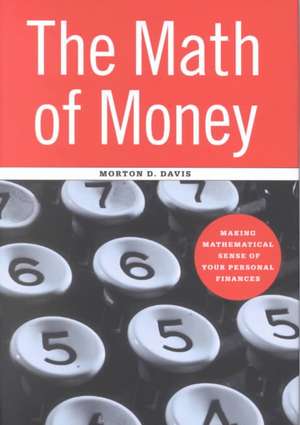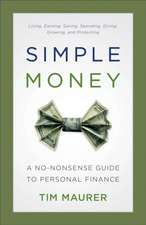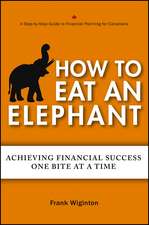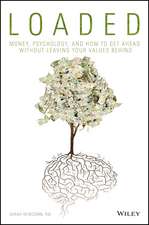The Math of Money: Making Mathematical Sense of Your Personal Finances
Autor Morton D. Davisen Limba Engleză Hardback – 25 iun 2001
| Toate formatele și edițiile | Preț | Express |
|---|---|---|
| Paperback (1) | 146.36 lei 3-5 săpt. | |
| Springer – 25 mai 2011 | 146.36 lei 3-5 săpt. | |
| Hardback (1) | 191.80 lei 3-5 săpt. | |
| Springer – 25 iun 2001 | 191.80 lei 3-5 săpt. |
Preț: 191.80 lei
Nou
Puncte Express: 288
Preț estimativ în valută:
36.71€ • 38.18$ • 30.30£
36.71€ • 38.18$ • 30.30£
Carte disponibilă
Livrare economică 25 martie-08 aprilie
Preluare comenzi: 021 569.72.76
Specificații
ISBN-13: 9780387950785
ISBN-10: 0387950788
Pagini: 199
Ilustrații: V, 199 p.
Dimensiuni: 155 x 235 x 19 mm
Greutate: 0.51 kg
Ediția:2001
Editura: Springer
Colecția Copernicus
Locul publicării:New York, NY, United States
ISBN-10: 0387950788
Pagini: 199
Ilustrații: V, 199 p.
Dimensiuni: 155 x 235 x 19 mm
Greutate: 0.51 kg
Ediția:2001
Editura: Springer
Colecția Copernicus
Locul publicării:New York, NY, United States
Public țintă
Popular/generalDescriere
This book reflects one mathematician's view of certain areas of economics and finance. It is not a how-to book, it is not exhaustive or rigorous, and it comes with no guarantee of instant wealth. It tries to maximize the use of the reader's imagination and minimize rote calculation. Although some mathematical background is assumed, ordinary high school algebra will usually suffice. Whenever possible, a verbal rather than a mathematical explanation is given, but where formulas serve a useful purpose they are introduced without derivation or apology. We are primarily concerned with concepts rather than applications, so many topics of practical importance are omitted or papered over-we do not worry about taxes, commissions, and fees and we assume an ideal world in which assets can always be bought at the same price for which they can be sold, and where loans have the same interest rate whether you make them or take them. On the other hand, we sniff out paradoxes and anomalies that chal lenge our intuition. At the beginning of each chapter we generally pose a few problems that are discussed later in the text. The reader is invited to use his "common sense" to find solutions to these problems. Those who accept the challenge may find their intuition is at odds with the solution more often than they expect. We hope the solutions surprise the readers and whet their appetites for further exploring. Does this mean that the book is of no practical interest? Not at all.
Cuprins
1 Investment Strategies.- 2 Interest.- 3 Bonds.- 4 Mortgages.- 5 Retirement.- 6 The Psychology of Investing.- 7 A Mathematical Miscellany.- 8 Statistics.- 9 Options.- Appendix Test Your Intuition: Answers.
Recenzii
From the reviews:
¿Money is peculiar stuff¿Or has been until now. Morton Davis¿s book is subtitled ¿Making Mathematical Sense of Your Personal Finances,¿ but as he points out in the introduction, this is not a how-to book. Its focus is on understanding the structure of financial transactions and the principles that underlie them. Each of the book¿s nine chapters takes a subject¿and trenchantly and readably demystifies it¿This is a clear and fascinating book, and anyone curious about the subject of money should read it.¿ ¿Plus Online Magazine, Cambridge University, U
"Davis offers a mathematician’s view of certain areas of economics and finance. For instance, he helps readers understand how interest compounds, how the stock market works, and how anyone can save enough money for retirement. … Each chapter begins with a section called ‘Test your intuition’ that brings such matters to light. Many other scenarios and exercises in the text put money matters into the context of everyday life." (Science Now, March, 2002)
"This book is a very unusual and very entertaining introduction to financial mathematics to readers with a modest mathematical background. Each chapter begins with a section entitled Test Your Intuition. A few multiple choice questions are presented; the reader is invited to guess the answer. … Then the chapter goes on to present the related basic notions and ideas … . I warmly recommend the book to anyone who wants to learn the basic ideas of financial mathematics in a very enjoyable way." (László I. Szabó, Acta Scientiarum Mathematicarum, Vol. 68, 2002)
"This book presents, in the author’s own words, a mathematician’s point of view about basic issues of finance: mortgages, interest rates, investment futures, options and so on. … The main purpose of the book is to challenge (wrong) intuitions about some basic financial issues and to teach how to think mathematically … . This book is intended for the general reader. … The math of money is full with delightful explanations and insights and it is very lively ... ." (José Lúis Fernandez Perez, Zentralblatt MATH, Vol. 983, 2002)
"This book covers the range of topics that one would expect to find in an undergraduate course on financial mathematics … . the material is treated at a level that would be understood by anyone who has studied mathematics to the final year of high school. Most of the material is treated by means of concrete examples … . I quite enjoyed this book and I would have no hesitation in recommending it to students as preliminary reading for finance and derivative courses." (W. P. Wood, The Australian Mathematical Society Gazette, Vol. 29 (1), 2002)
"Each of the book’s nine chapters takes a subject – ‘Interest’ or ‘Statistics’, for example – and trenchantly and readably demystifies it. ... Though the explanations are simple, they are not simplified, and indeed several examples are included ... . The examples are, though, are carefully chosen to help the story along, not merely stuck in for the sake of it. ... this is a clear and fascinating book, and anyone curious about the subject of money should read it." (Mark Wainwright, www.plus.math.org, Issue 16, 2002)
¿Money is peculiar stuff¿Or has been until now. Morton Davis¿s book is subtitled ¿Making Mathematical Sense of Your Personal Finances,¿ but as he points out in the introduction, this is not a how-to book. Its focus is on understanding the structure of financial transactions and the principles that underlie them. Each of the book¿s nine chapters takes a subject¿and trenchantly and readably demystifies it¿This is a clear and fascinating book, and anyone curious about the subject of money should read it.¿ ¿Plus Online Magazine, Cambridge University, U
"Davis offers a mathematician’s view of certain areas of economics and finance. For instance, he helps readers understand how interest compounds, how the stock market works, and how anyone can save enough money for retirement. … Each chapter begins with a section called ‘Test your intuition’ that brings such matters to light. Many other scenarios and exercises in the text put money matters into the context of everyday life." (Science Now, March, 2002)
"This book is a very unusual and very entertaining introduction to financial mathematics to readers with a modest mathematical background. Each chapter begins with a section entitled Test Your Intuition. A few multiple choice questions are presented; the reader is invited to guess the answer. … Then the chapter goes on to present the related basic notions and ideas … . I warmly recommend the book to anyone who wants to learn the basic ideas of financial mathematics in a very enjoyable way." (László I. Szabó, Acta Scientiarum Mathematicarum, Vol. 68, 2002)
"This book presents, in the author’s own words, a mathematician’s point of view about basic issues of finance: mortgages, interest rates, investment futures, options and so on. … The main purpose of the book is to challenge (wrong) intuitions about some basic financial issues and to teach how to think mathematically … . This book is intended for the general reader. … The math of money is full with delightful explanations and insights and it is very lively ... ." (José Lúis Fernandez Perez, Zentralblatt MATH, Vol. 983, 2002)
"This book covers the range of topics that one would expect to find in an undergraduate course on financial mathematics … . the material is treated at a level that would be understood by anyone who has studied mathematics to the final year of high school. Most of the material is treated by means of concrete examples … . I quite enjoyed this book and I would have no hesitation in recommending it to students as preliminary reading for finance and derivative courses." (W. P. Wood, The Australian Mathematical Society Gazette, Vol. 29 (1), 2002)
"Each of the book’s nine chapters takes a subject – ‘Interest’ or ‘Statistics’, for example – and trenchantly and readably demystifies it. ... Though the explanations are simple, they are not simplified, and indeed several examples are included ... . The examples are, though, are carefully chosen to help the story along, not merely stuck in for the sake of it. ... this is a clear and fascinating book, and anyone curious about the subject of money should read it." (Mark Wainwright, www.plus.math.org, Issue 16, 2002)
Textul de pe ultima copertă
Learn how to calculate the math behind your mortgage, the interest rate on your credit cards, the risks youre taking on the stock market...
Making the right decisions about day-to-day finances can be tricky, in large part because the math involved can be just as tricky as the decisions themselves. In a clear and conversational manner, Morton D. Davis describves the equations behind:
Mortgages: Did you know that often 15 years of payments on a 30-year mortgage are mostly paxing off interest, not the loan itself?
Stocks: Calculating investor psychology is important. Stcoks have no greater worth than how much people are willing to pay for them.
Interest Rates: How does compound interest work mathematically? You might guess that a loan shark who asks for 5 percent interest on a one-week loan is charging 260 percent interest per year. Using compound interest, you can show the actual interest rate is more than four times that!
Retirement Funds: How do I save enough money - and keep it - to last for the rest of my life?
Social Security: Does it make sense to delay my payments?
Using entertaining quizzes that test your intuition, easy-to-understand examples, and illustrative tables, The Math of Money explains how to calculate, and truly understand, your financial picture.
Making the right decisions about day-to-day finances can be tricky, in large part because the math involved can be just as tricky as the decisions themselves. In a clear and conversational manner, Morton D. Davis describves the equations behind:
Mortgages: Did you know that often 15 years of payments on a 30-year mortgage are mostly paxing off interest, not the loan itself?
Stocks: Calculating investor psychology is important. Stcoks have no greater worth than how much people are willing to pay for them.
Interest Rates: How does compound interest work mathematically? You might guess that a loan shark who asks for 5 percent interest on a one-week loan is charging 260 percent interest per year. Using compound interest, you can show the actual interest rate is more than four times that!
Retirement Funds: How do I save enough money - and keep it - to last for the rest of my life?
Social Security: Does it make sense to delay my payments?
Using entertaining quizzes that test your intuition, easy-to-understand examples, and illustrative tables, The Math of Money explains how to calculate, and truly understand, your financial picture.










